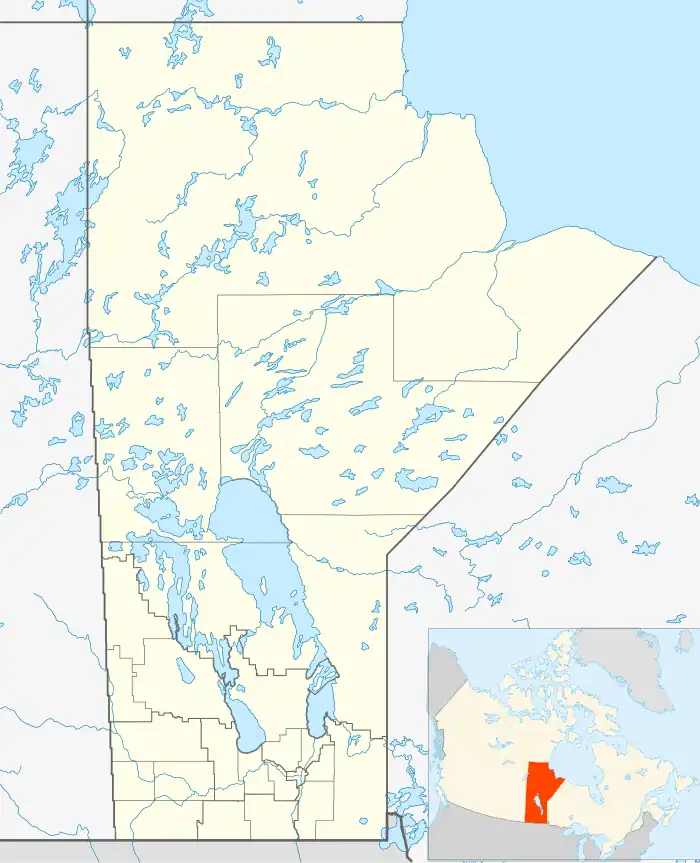| Location | |
|---|---|
 | |
| Location | Sherridon |
| Province | Manitoba |
| Country | Canada |
| Coordinates | 55°08′06″N 101°06′12″W / 55.135074°N 101.103339°W |
| Production | |
| Products | zinc, copper, gold and silver |
| History | |
| Discovered | 1899 |
| Opened | 1931 |
| Closed | 1951 |
| Owner | |
| Company | Sherritt International |
| Local impacts | |
| Pollution | acid, metals, sulphide |
| Impacted | Kississing Lake |
Sherritt-Gordon Mine is a defunct zinc and copper mine in Sherridon, Manitoba, Canada.
Pollution from the mine contaminated Kississing Lake in what has been described as "one of the worst cases of acidic mine drainage in the world."
Workers staged a month's long strike at the mine in 1947.
Description
Sherritt-Gordon Mine is a defunct zinc and copper mine in Sherridon, Manitoba. It is located about 800 kilometres north west of the provincial capital city of Winnipeg.[1] The mine is near Flin Flon.[2]
The mine is located on the shore of Kississing Lake.[3]
History
Geological exploration of the area began in 1899, followed by prospectors from the Flin Flon area who were guided by local Métis. In 1923, deposits of copper-zinc sulphides were staked on the east shore of Kississing Lake, which were developed into the Sherritt-Gordon Mine.[3][4]
The mine operated from 1931 to 1951 producing zinc and copper with low amounts of gold and silver.[1]
On August 13, 1947, workers at the mine went on strike after pay negotiations with Sherritt International failed to make progress.[5] The Co-operative Commonwealth Federation political party objected to the influx of the Royal Canadian Mounted Police during the stroke[5] By November the strike was ongoing, with striking workers blocking non-striking workers on November 5.[5] Courts passed an injunction in the second week of November against the strike.[5]
The mine and produced 7.7 mega tons of ore[1] which were dumped over an area covering 47 hectares[6] including next to Camp Lake.[6] Water from the contaminated Camp Lake has since leached into Kississing Lake.[7] Weathering of the mine's tailings has released sulphate, metals and acid into surface and ground water for over 50 years since the mine has closed.[1] In 2009, The Winnipeg Free Press described the pollution around the mine as "one of the worst cases of acidic mine drainage in the world".[7]
The Government of Manitoba started remediation of the pollution from the mine in 2009.[6] In 2017, unhappy with the progress of the remediation, members of the local community briefly blockaded the local highway, preventing access.[6]
See also
References
- 1 2 3 4 Moncur, Michael C.; Ptacek, Carol J.; Hayashi, Masaki; Blowes, David W.; Birks, S. Jean (2014-02-01). "Seasonal cycling and mass-loading of dissolved metals and sulfate discharging from an abandoned mine site in northern Canada". Applied Geochemistry. 41: 176–188. doi:10.1016/j.apgeochem.2013.12.007. ISSN 0883-2927.
- ↑ Owen, Bruce (2009-10-29). "Province spending $42M on mine cleanup". Winnipeg Free Press. Archived from the original on 2023-08-21. Retrieved 2023-08-20.
- 1 2 Georgetown University, Office of the Chief of Naval Operations (1956). Canadian North. United States: Technical Assistant to Chief of Naval Operations for Polar Projects (OP-O3A3). pp. 222–223. Archived from the original on 6 July 2023. Retrieved 23 April 2023.
 This article incorporates text from this source, which is in the public domain.
This article incorporates text from this source, which is in the public domain. - ↑ Lawrence Barkwell (2018). "Historic Métis Settlements in Manitoba and Geographical Place Names" (PDF). www.metismuseum.ca. Louis Riel Institute. Archived (PDF) from the original on 22 April 2023. Retrieved 18 August 2023.
- 1 2 3 4 Sokalski, Alexander (2003). "Manitoba History: The Sheritt-Gordon Mine Strike of 1947". Manitoba Historical Society. Archived from the original on 2023-01-27. Retrieved 2023-08-20.
- 1 2 3 4 "'No trust whatsoever': Northern Manitoba community wants consultation, not action, on mine rehabilitation". CBC. 7 Aug 2017. Archived from the original on 4 June 2023. Retrieved 20 August 2023.
- 1 2 "$34.5M to clean up Sherridon tailings". The Reminder (Flin Flon). 2009-02-11. Retrieved 2023-08-20.